Join prominent members of the International COVID-19 Network for a 2-part virtual panel where they will present the advantage of exchanging data and their results along detection, outcome prediction and Long-COVID risks and monitoring.
In the current worldwide COVID-19 pandemic situation, fast developments not only in vaccines are needed, but also in analytical technology to detect the infection, predict outcomes during hospitalization and more and more important towards Long COVID. Successful development of diagnostic routines need large number of samples and spectroscopic data generated thereof as well as comprehensive metadata coverage. Initiated by Bruker and under guidance of the Australian National Phenome Center (ANPC) run by Prof. Jeremy Nicholson, a worldwide international COVID Research Network consisting of several institutions* collaborate, using completely standardized NMR procedures producing spectral data, exchangeable and integratabtle across the Network.
Nuclear Magnetic Resonance (NMR) spectroscopy technology is a robust analysis technique that can provide a solution to challenges of COVID-19 diagnosis and prediction based on metabolic changes caused by the virus once RUO results can be transferred into certified routines. The concept of phenoconversion and phenoreversion has been developed to follow these changes upon infection up to recovery. Applying NMR spectroscopy with its unique reproducibility and transferability enables the development of sensitive and specific routines for COVID analysis. This information is vital to develop diagnostic and predictive actions, because NMR can connect metabolic information with systems biology on a personalized basis. Because of these advantages, NMR has the potential for the development of effective health monitoring, allowing early detection and treatment effects.
Key Topics Include:
- The level of complexity COVID-19 presents for emerging technology applications and scientific concepts
- How the mass scale of the pandemic encouraged international collaborative efforts to meet the challenges posed by the global outbreak of COVID-19
- The need for powerful tools, like NMR, to enable research and development for new treatments
Who Should Attend?
This webinar is of particular interest to Researchers in COVID-19, Heads of Clinical Research, Head of Clinical Chemistry, University Hospitals, Medical Universities, Institute for Clinical and Experimental Medicine, Metabolic Centres, Epidemiologists, and those researching Oncology, Diabetes, Infection, Paediatrics and Cardiology.
Presenters
Professor
Metabolomics
Universität zu Lübeck
Group Leader
Metabolomics & Systems Medicine
Eberhard Karls University Tübingen








